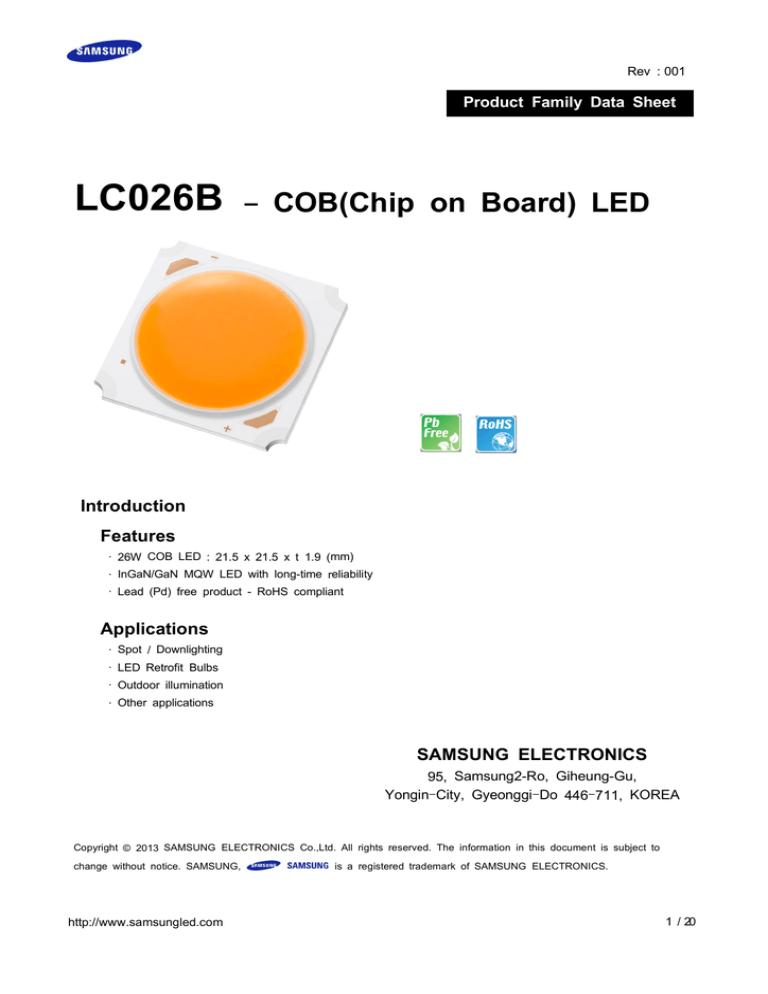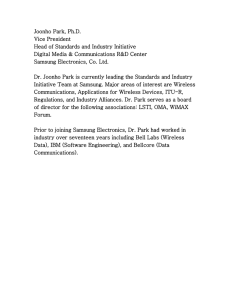
Rev : 001
Product Family Data Sheet
LC026B
- COB(Chip on Board) LED
Introduction
Features
· 26W COB LED : 21.5 x 21.5 x t 1.9 (mm)
· InGaN/GaN MQW LED with long-time reliability
· Lead (Pd) free product - RoHS compliant
Applications
· Spot / Downlighting
· LED Retrofit Bulbs
· Outdoor illumination
· Other applications
SAMSUNG ELECTRONICS
95, Samsung2-Ro, Giheung-Gu,
Yongin-City, Gyeonggi-Do 446-711, KOREA
Copyright © 2013 SAMSUNG ELECTRONICS Co.,Ltd. All rights reserved. The information in this document is subject to
change without notice. SAMSUNG,
http://www.samsungled.com
is a registered trademark of SAMSUNG ELECTRONICS.
1 / 20
Contents
1. Absolute Maximum Rating
-----------------
3
2. Characteristics
-----------------
3
3. Binning Structure
-----------------
4
4. Chromaticity Coordinates
-----------------
5
5. Typical Characteristics Graph
-----------------
6
6. Outline Drawing & Dimension
-----------------
8
7. Reliability Test Items and Conditions
-----------------
9
8. Label Structure
----------------- 10
9. Lot Number
----------------- 11
10. Tray Dimension
----------------- 12
11. Aluminum Bag Dimension
----------------- 12
12. Box & Pad Dimension
----------------- 13
13. Packing Structure
----------------- 14
14. Precaution for use
----------------- 16
15. Revision History
----------------- 18
http://www.samsungled.com
2 / 20
1. Absolute Maximum Rating
1) Operation Forward Current (Ta = 25°C) .....................................................
2) LED Junction Temperature ( TJ ) ...............................................................
940 mA
150°C
3) Operating Temperature Range ( Topr ) ............................................... -40°C ∼ 85°C
4) Storage Temperature Range ( Tstg ) ................................................. -40°C ∼ 120°C
5) Power Dissipation ( PD ) .................................................................................
34W
2. Characteristics
1) Electro-Optical characteristics (Ta : 25°C)
Item
Unit
Condition
Rank
2700K
Luminous Flux1)
lm2)
V3)
CRI4)
Thermal
℃/W
Resistance (Rth,j-c)
View Angle5)
°
Typ
Max
27
2510
-
2710
28
2710
-
2920
29
2920
-
31
2850
-
3130
32
3130
-
3360
33
3360
-
IF = 720 mA
5000K
Forward Voltage
2F
Min
3F
IF = 720 mA
YH
33.5
36.5
38.5
IF = 720 mA
-
80
-
-
-
-
IF = 720 mA
-
1.2
-
115°
-
Note :
1) Samsung LED tested in pulsed condition. TJ=25°C, pulse width is 10ms at rated test current.
2) Samsung LED has ±7% tolerance of flux measurements.
3) Samsung LED has ±5% tolerance of forward voltage measurements.
4) Samsung LED has ±1 tolerance of CRI measurements.
5) Samsung LED tested in DC=720mA after luminous flux is saturated.
http://www.samsungled.com
3 / 20
3. Binning Structure
(Condition : IF = 720 mA, Ta : 25°C)
1) VF Binning
CCT
VF (V)
VF
Product Code
Rank
Min
Typ
Max
2700K
SPHWW1HDNC25YHW32F
YH
33.5
36.5
38.5
5000K
SPHCW1HDNC25YHRT3F
YH
33.5
36.5
38.5
2) Color Binning
CCT
Product Code
Color Rank
Chromaticity Bins
2700K
SPHWW1HDNC25YHW32F
W3
WA
5000K
SPHCW1HDNC25YHRT3F
RT
RW, RX, RY, RZ
3) Luminous Flux Binning
CCT
2700K
5000K
Product Code
SPHWW1HDNC25YHW32F
SPHCW1HDNC25YHRT3F
http://www.samsungled.com
Range (lm)
Flux
Flux
Rank
Bin
Min
Typ
Max
27
2510
-
2710
28
2710
-
2920
29
2920
-
31
2850
-
3130
32
3130
-
3360
33
3360
-
2F
3F
4 / 20
4. Chromaticity Coordinates
(Condition : IF = 360 mA, Ta : 25°C)
1) 2700K
Macadam Ellipse
3step (WA)
x
y
0.4578 0.4101
θ
53.7
a
b
0.0081 0.0042
4) 5000K
Table
RW
RX
RY
RZ
CIE X
0.3376
0.3463
0.3451
0.3371
0.3371
0.3451
0.3440
0.3366
0.3463
0.3551
0.3533
0.3451
0.3451
0.3533
0.3515
0.3440
CIE Y
0.3616
0.3687
0.3554
0.3490
0.3490
0.3554
0.3428
0.3369
0.3687
0.3760
0.3620
0.3554
0.3554
0.3620
0.3487
0.3428
Note :
1) The Chromaticity Coordinates refers to ANSI C78.377-2008
2) Samsung LED has ±0.005 tolerance of chromaticity(x,y).
http://www.samsungled.com
5 / 20
5. Typical Characteristics Graph
* These graphs show typical values. (Ta : 25°C)
Forward Current vs. Relative Luminous Flux
Forward Current vs. Forward Voltage
Forward current vs. Chromaticity Coordination
Temperature vs. Chromaticity Coordination
Temperature vs. Voltage
Temperature vs. Relative Luminous Flux
http://www.samsungled.com
6 / 20
Relative Spectral Emission
<2700K>
<5000K>
Radiation Pattern
Derating Curve
http://www.samsungled.com
7 / 20
6. Outline Drawing & Dimension
unit : mm
Tolerance : ± 0.15
http://www.samsungled.com
8 / 20
7. Reliability Test Items and Conditions
1) Test Items
Test Items
Test Conditions
Test
Hours/Cycles
MSL test
125°C 24h drying
→ MSL 2a(Sunnix5) 60°C, 60%RH 120h(drying after 2h)
→ 260°C 10sec 3time(each Cycle
Room Temperature cooling, MSL after 15min during 4 h)
1 time
Room Temperature life
test
25°C, IF = Max
1,000 h
High Temperature humidity
life test
85°C, 85% RH, DC Derating IF = Max
1,000 h
High Temperature life test
85°C, DC Derating IF = Max
1,000 h
Low Temperature life test
-40°C, DC 940 mA
1,000 h
High Temperature Storage
120°C
1,000 h
Low Temperature Storage
-40°C
1,000 h
Thermal Shock
-45°C/15min → 125°C/15min
Temperature changes in 5min.
200 cycles
Temperature Cycle
On/Off test
-40 / 85°C, each 20min, 100min transfer
Power On/off each 5min, DC 720 mA
100 cycles
Temperature humidity
Cycle Storage
-10°C↔25°C, 95%RH ↔ 85°C, 95%RH [24h/1Cycle]
100 cycles
ESD(HBM)
R1 : 10 ㏁, R2 : 1.5 ㏀, C : 100 ㎊
5 times
(± 5 ㎸)
ESD(MM)
R1 : 10 ㏁, R2 : 0 ㏀, C : 200 ㎊
5 times
(± 0.5 ㎸)
Vibration
20~80㎐(Displacement:0.06inch, Max 20G)
80~2㎑ (Max 20G)
Min. Frequency ↔ Max. Frequency 4min transfer
4 times
Shock
1500G, 0.5ms, Every 6faces (3axis X 2faces)
5 times
Salt Spray
35°C, salt water 5% 8h spray → 16h leaving alone
2 cycles
2) Criteria for Failure
Limit
Item
Symbol
Test Condition
[Ta = 25°C]
Min.
Max.
Forward Voltage
VF
720 mA
L.S.L. × 0.9
U.S.L. × 1.1
Luminous flux
lm
720 mA
L.S.L. × 0.7
U.S.L. × 1.3
* U.S.L. : Upper Standard Level
http://www.samsungled.com
L.S.L. : Lower Standard Level
9 / 20
8. Label Structure
* Bag & Inner box
* Box
ⓐ ⓑⓒ ⓓⓔⓕ
YHRT3F
SPHCWTH1NC25YHRT3F
YHRT3F 01
IIIIIIIIIIIIIIIIIIIIIIIIIIIIIIIIIIIIIIIIIIII
YHRT3F
Rank
SPHCWTH1NC25YHRT3F
Code
●◎◇◆□■△△△ / I▲▲▲ / XXX PCS
●◎◇◆□■△△△ / I▲▲▲ / XXX PCS
IIIIIIIIIIIIIIIIIIIIIIIIIIIIIIIIIIIIIIIIIIII
IIIIIIIIIIIIIIIIIIIIIIIIIIIIIIIIIIIIIIIIIIII
IIIIIIIIIIIIIIIIIIIIIIIIIIIIIIIIIIIIIII
OEB1906001/40
Lot
number
IIIIIIIIIIIIIIIIIIIIIIIIIIIIIIIIIIIIIII
OEB1906002/40
IIIIIIIIIIIIIIIIIIIIIIIIIIIIIIIIIIIIIII
OEB1906003/40
IIIIIIIIIIIIIIIIIIIIIIIIIIIIIIIIIIIIIII
OEB1906004/40
YHRT3F 01
IIIIIIIIIIIIIIIIIIIIIIIIIIIIIIIIIIIIIIIIIIII
Tray
number
/Q'ty
IIIIIIIIIIIIIIIIIIIIIIIIIIIIIIIIIIIIIII
OEB1906005/40
IIIIIIIIIIIIIIIIIIIIIIIIIIIIIIIIIIIIIII
OEB1906001/40
IIIIIIIIIIIIIIIIIIIIIIIIIIIIIIIIIIIIIII
OEB1906011/40
IIIIIIIIIIIIIIIIIIIIIIIIIIIIIIIIIIIIIII
OEB1906002/40
IIIIIIIIIIIIIIIIIIIIIIIIIIIIIIIIIIIIIII
OEB1906012/40
IIIIIIIIIIIIIIIIIIIIIIIIIIIIIIIIIIIIIII
OEB1906003/40
IIIIIIIIIIIIIIIIIIIIIIIIIIIIIIIIIIIIIII
OEB1906013/40
IIIIIIIIIIIIIIIIIIIIIIIIIIIIIIIIIIIIIII
OEB1906004/40
IIIIIIIIIIIIIIIIIIIIIIIIIIIIIIIIIIIIIII
OEB1906005/40
IIIIIIIIIIIIIIIIIIIIIIIIIIIIIIIIIIIIIII
OEB1906006/40
IIIIIIIIIIIIIIIIIIIIIIIIIIIIIIIIIIIIIII
OEB1906007/40
IIIIIIIIIIIIIIIIIIIIIIIIIIIIIIIIIIIIIII
OEB1906008/40
IIIIIIIIIIIIIIIIIIIIIIIIIIIIIIIIIIIIIII
OEB1906009/40
IIIIIIIIIIIIIIIIIIIIIIIIIIIIIIIIIIIIIII
OEB1906010/40
[Box Label]
N.B) Denoted rank is the only example.
Rank Code
ⓐⓑ : Forward Voltage (VF) Rank (refer to page. 4)
ⓒⓓ : Chromaticity Coordinate Rank (refer to page. 5)
ⓔⓕ : Luminous Flux (ΦV) Rank (refer to page. 4)
http://www.samsungled.com
10 / 20
9. Lot Number
The Lot number is composed of the following characters
●◎◇◆□■△△△ / I▲▲▲ / xxx PCS
● : Production Site (S:SAMSUNG ELECTRONICS, G:Gosin China, A:Aprosystems)
◎ : L (LED)
◇ : Product State (A:Normality, B: Bulk, C:First Production, R:reproduction, S:Sample)
◆ : Year (U:2010, V:2011, W:2012, X:2013...)
□ : Month (1 ~ 9, A~C)
■ : Day (1 ~ 9, A, B ~ V)
△ : SAMSUNG LED Product number (1 ~ 999)
▲ : Tray Number (1 ~ 999)
http://www.samsungled.com
11 / 20
10. Tray Dimension
11. Aluminum Bag Dimension
Silica gel & Humidity Indicator Card in Aluminum Bag
http://www.samsungled.com
12 / 20
12. Box & Pad Dimension
1) Out BOX
2) Inner BOX
3) Pe-foam PAD
http://www.samsungled.com
13 / 20
13. Packing Structure
1-1). Tray Packing (When 5 Trays)
Max Amount(pcs)
Tray
Al Bag
Box
60
300
1200
http://www.samsungled.com
14 / 20
1-2). Tray Packing (When Less than 5 Trays)
EX) Module tray 2pcs : Pe-foam(10t) * 3pcs
Module tray 3pcs : Pe-foam(10t) * 2pcs
Module tray 4pcs : Pe-foam(10t) * 1pcs
http://www.samsungled.com
15 / 20
14. Precaution for use
1)
Shelf life in sealed bag : 12 months at < 40°C and < 90% relative humidity(RH)
2)
Peak package body temperature : 240°C.
3)
After this bag is opened, devices that will be subjected to reflow solder
or other high temperature processes must be :
a. Mounted within 672 hours at factory conditions of equal to or
less than 30°C / 60% RH, or
b. Stored at < 10% RH
4)
Devices require bake, before mounting, if :
a. Humidity Indicator Card is > 65% when read at 23 ± 5°C, or
b. 2a is not met.
5)
If baking is required, devices must be baked for 1 hours at 60 ± 5°C
Note : If device containers cannot be subjected to high temperature or
shorter bake times are desired, reference IPC / JEDEC J-STD-033
for bake procedure.
6) The LEDs are sensitive to the static electricity and surge current.
It is recommended to use a wrist band or anti-electrostatic glove when handling
the LEDs. If voltage exceeding the absolute maximum rating is applied to LEDs,
it may cause damage or even destruction to LED devices.
Damaged LEDs may show some unusual characteristics such as increase in
leakage current, lowered turn-on voltage, or abnormal lighting of LEDs at low
current.
http://www.samsungled.com
16 / 20
7) Please do not following behavior in resin area.
(Handling, Pressing, Touching, Rubbing, Contacting tweezers, Cleaning)
But it's ok in handling area.
8) VOCs (volatile organic compounds) may be occurred by adhesives, flux, hardener or
organic additives which is used in luminaires (fixture) and LED silicone bags are
permeable to it. It may lead a discoloration when LED expose to heat or light.
This phenomenon can give a significant loss of light emitted(output) from the luminaires
(fixtures).
In order to prevent these problems, we recommend you to know the physical properties
for the materials used in luminaires, It requires to select carefully.
http://www.samsungled.com
17 / 20
Revision History
(LC026B)
Date
Revision History
2013.10.07
1st Version (Preliminary)
http://www.samsungled.com
Writer
Drawn
Approved
SH.AN
HK.KIM
18 / 20




